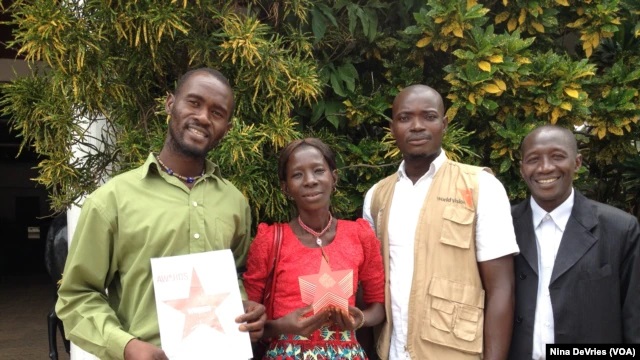People on the teams that buried Ebola victims in Sierra Leone have been stigmatized and shunned at home because of their connection to the deadly virus. But abroad, they’re being recognized and praised.
Eight hundred burial team members from across the country have been named recipients of the Bond International Humanitarian Award for their contributions to stopping the spread of Ebola. The award is given by Bond, a British-based development organization, in recognition of unsung heroes.
One such hero is Maseray Kamara, who said she became a burial team member because she wanted to protect other women from the virus, which is highly contagious right after an Ebola victim dies. Kamara is an Ebola survivor herself and was one of the first women to join a burial team.
Another team member, Siddie Kanu, works in the Bo district, in southern Sierra Leone. The area hasn’t had an Ebola case since January, a fact that makes Kanu “very proud, happy.”
Kanu said, however, that there are still challenges in the fight against Ebola. Some people in remote places are still in denial that the virus is real.
Also, with the rainy season having begun, the World Health Organization has raised concern about the logistics of quickly reaching a burial team when an Ebola patient dies.
“We find it very difficult,” Kanu said. “You get stuck and then you have to walk [in the rain], and then maybe where you’re stuck there is no village around for help. So you have to walk two, three miles to get people to help you.”
There is support for the burial teams. Three international aid groups have worked together to train members how to perform safe, dignified burials. Now, all burials in Sierra Leone, whether they involve Ebola cases or not, have to be done by burial teams.
Kayode Akintola is the Sierra Leonean representative for the Catholic Agency for Overseas Development, one of the aid groups involved. His burial teams are based in Kambia, where cases are still occurring. Kambia district is also near the border with Guinea, where the virus continues to spread.
“That is where the challenge has continued to be,” Akintola said. “There have been some cross-border issues around there.”
Still, he’s hopeful and said the award and recognition that goes with it would help keep burial teams motivated.
Grace Kargbo is a burial team manager for World Vision, another aid partner. She was in London this week to receive the award on behalf of the teams. She agreed with Akintola about how the award would inspire team members to keep going, even though many are being shunned, sometimes even by their own families.
“They have sacrificed so much — their lives, their safety, their health — to serve as burial team members. … I think they deserve this recognition, and I believe it will influence the reverse of the stigmatization that they face,” Kargbo said. “So it’s really huge for the burial teams and for all of us.”
To date, more than 11,000 people have died in West Africa from the Ebola virus.




 Post a comment
Post a comment









